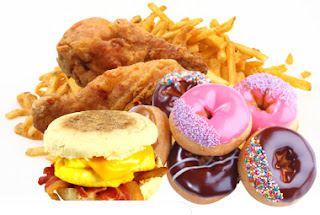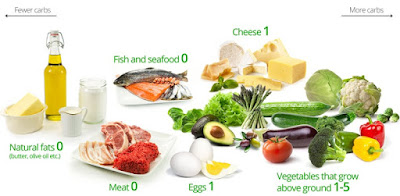You may have heard the terms "keto diet", "ketosis" or "ketogenic"; but what do all these terms mean?
A keto diet is well known for being a strict low carbohydrate, high fat diet.
But wait, isn't fat bad for you?
We have been taught over the years to avoid fat; that fat is the devil. Everyone, stay away from fat! Always buy 'low fat' or 'fat free' products!
The things is that there are such things as 'good' fats and 'bad' fats. What we want to do is cut back on the bad fats and load up on the good fats.
Bad Fats
Trans fats are the fats that we should be staying away from. Processed trans fats are the types of fats that people are most familiar with. These are the fats that can actually be very damaging to your health.
 Trans fats are formed during food production through the processing of
polyunsaturated fats, which are also know as PUFA's. This is why it’s important to only choose PUFAs
that are unprocessed and not overheated or altered - we do not want to be creating trans fats and adding them to our diets. Processing PUFAs can create harmful free radicals, and trans fats are often
created from oils that contain genetically modified seeds.
Trans fats are formed during food production through the processing of
polyunsaturated fats, which are also know as PUFA's. This is why it’s important to only choose PUFAs
that are unprocessed and not overheated or altered - we do not want to be creating trans fats and adding them to our diets. Processing PUFAs can create harmful free radicals, and trans fats are often
created from oils that contain genetically modified seeds.
Examples of trans fats include hydrogenated and partially hydrogenated oils, such as those found in margarines, processed cookies, cakes and crackers, as well as in fast food. They are also found in processed oils, such as sunflower, canola and safflower oils.
Risks of eating trans fats include:
- Increased risk of heart disease
- Increased risk of cancer
- Reduced HDL cholesterol and increased LDL cholesterol
- Pro-inflammatory
- Higher risk of developing type 2 diabetes
Good Fats
The good fats on keto include saturated, monounsaaturated (MUFAs) and polyunsaturated (PUFAs) fats.
Examples of saturated fats to include in your diet:
- butter
- red meat
- cream
- coconut oil
- MCT oil
- eggs
Saturated fats are the fats that, for years, we have been told to avoid and limit as much as possible. However, recent studies have shown that these fats do have health benefits and that there is no corelation between eating saturated fats and risk of heart disease. SAturated fats can help improve LDL and HDL cholesterol levels, as well as boost immunity and support hormone creation.
 Examples of MUFAs:
Examples of MUFAs:- olive oil
- avocado oil
- bacon grease
- macadamia nuts
MUFA's also have studies backing their health effects, including reduced insulin resistance, reduced belly fat and better cholesterol levels.

Example of PUFA's:
- flax seeds
- walnuts
- sesame oil
- fatty fish
- chia seeds
As previosly mentioned, PUFA's are best eaten cold to avoid creation of trans fats and free radicals. Omega 3 and 6 are included in the PUFA category, and we have all heard how important these are for our health. A healthy balance of these omega may decrease risk for heart disease and stoke. They are also great for brain health.
How much fat do I need?
To achieve ketosis, the majority of your calories should be coming from the healthy, good fats. This is going to be around 65-80% of diet. 15-25% will be from protein and 5-10% from carbohydrates.
I know what you are thinking, that's so much fat! Yes, at first it may seem like an overwhelming amount of fat, but as you go on and get the hang of the keto diet, it will become natural.
Only 5% Carbohydrates?
This is what will be difficult when starting out with a keto diet. To achieve ketosis, you want to consume around 20g or less of net carbs. Net carbs are the total amount of carbohydrates, minus the fiber. So for example, 100g of broccoli has 7g of carbs and 3g of fiber. Therefore, the net carbs would be only 4 grams.
A few foods low in carbohydrates include:
- meats
- broccoli
- cauliflower
- asparagus
- lettuce
- spinach
- eggs
- cream
- cheese
- avocado
- almonds
- walnuts
- chia seeds
- flax seeds
- oils

Ketosis is a metabolic state where your body produces ketones. When your body does not have enough glucose to perform its normal actvities, it will start to burn fat stores instead. This produces acids known as ketones, which your body will excrete in your urine. When your body uses it's fat stores to create energy, this results in quick weight loss. This will also prevent the blood sugar 'roller coaster' since without carbohydrates, blood glucose levels will remain stable.
Benefits of Ketosis
Obviously, weight loss is a great benefit of a keto diet, but there are also other great benefits as well!
These include:
- increased clarity and mental focusing
- prevents heart disease
- decrease inflammation
- improved energy levels
- better gastrointestinal health
- stabilizes hormones



Very interesting diet
ReplyDeleteGreat post!
ReplyDeleteThank you for sharing this informative post with us! You may also like this article http://www.agsinger.com/hemorrhoids-on-keto-is-your-diet-the-cause/ in which you may find lots of useful information about ways of preventing many health problems and risks associated with keto diet. I completely agree with you that keto may not be a “magic diet” but it sure is my favorite type of diet to cut weight, as my belly fat melts like butter in the sun :)
ReplyDelete